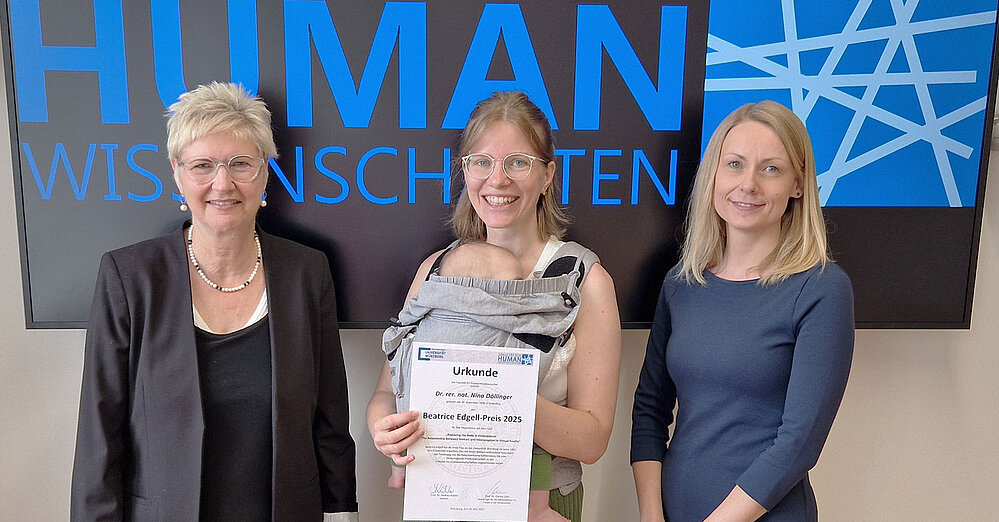Beatrice Edgell Award
Since 2006, the Faculty of Human Sciences has been giving out the Beatrice Edgell Award for outstanding doctoral theses written by women. The award comes with a cash prize of €1,000. The wide range of academic disciplines within the Faculty will be taken into account in the selection process.
It is designed to encourage women to pursue a career in research, advance the careers of female early career researchers and increase their chances of securing research funding, fellowships or junior professorships.
In 1901, British psychologist Beatrice Edgell was the first woman to obtain a doctorate from the University of Würzburg. Her doctoral thesis titled ‘Die Grenzen des Experiments als einer psychologischen Methode’ (‘The Limitations of Experiment as a Psychological Method’) was supervised by Oswald Külpe, a pioneer in the field of experimental psychology. After her return to the UK, Beatrice Edgell embarked on a remarkable academic career at the renowned Bedford College, now part of Royal Holloway, at the University of London.
Beatrice Edgell became the first female professor of psychology in the UK (in 1927) and the first female president of various renowned societies and professional bodies for psychologists in the UK, e.g. of the British Psychological Society (in 1930) and the Aristotelian Society (in 1927).
1) Eligibility requirements:
- Doctorate qualification ‘magna cum laude’ or ‘summa cum laude’; different grading conventions within the respective disciplines will be taken into account
- Publications in the context of the doctoral thesis
- Further publications during doctoral degree (e.g., scientific journal articles, conference contributions, monographs)
- Oral presentations during doctoral degree (e.g., scientific conference contributions)
- Further university commitments (e.g., lectures, seminars, tutorials, third-party funds and donations, academic self-governance)
2) Membership of the Faculty:
- Candidates must be employed at the Faculty of Human Sciences and the first reviewer of their doctoral thesis must be a staff member of the Faculty of Human Sciences.
- The candidates’ future career and development prospects at the Faculty of Human Sciences will be taken into consideration in the selection process.
3) Application requirements:
- Cover letter with a summary of research accomplishments to date (1 page) and outlining future potential for further achievement (1 page)
- Copy of doctorate certificate
- Curriculum vitae with a list of scientific achievements:
- Publications in the context of doctoral thesis
- Further publications during doctoral degree (e.g., scientific journal articles, conference contributions, monographs)
- Oral presentations during doctoral degree (e.g., scientific conference contributions)
- Lectures, seminars, tutorials held
- Further university commitments (e.g., collaboration in research projects, third-party funds and donations, academic self-governance)
Awardees

Dr. Nina Döllinger
In 2025, the Beatrice Edgell Prize goes to a researcher at the Institute of Human-Computer-Media: Dr Nina Döllinger completed her dissertation project ‘Replacing the Body in Embodiment:
The Relationship Between Avatars and Interoception in Virtual Reality’ with the grade summa cum laude. In her partially cumulative doctorate, she focussed on the question of how the embodiment of avatars in VR affects physical self-perception and what implications this has for possible body therapy applications. To this end, she developed a framework for self-perception and avatar perception, conducted a systematic literature review on VR-based interventions, and investigated different aspects of avatar embodiment and their effects on self-perception and avatar perception in a series of empirical laboratory studies. In this way, she gained insights into the linkage, parallelism and interaction of self-perception and avatar perception on both a physical and cognitive level. The dissertation comprises a total of five peer-reviewed full paper publications, two peer-reviewed short paper publications and a jacket section presenting her theoretical work. In her work, Dr Döllinger has succeeded in combining basic research with an application-oriented perspective and shedding light on the interaction processes between self-perception and avatar perception.
Dr Nina Döllinger is an outstanding doctoral candidate at all levels who, in addition to her partially cumulative doctoral thesis, impresses with further publications and a lively lecture program. Her broad commitment is evident in the areas of teaching, academic self-administration as well as through her television contributions and regular further training.
She is a worthy successor to Beatrice Edgell, demonstrating that overcoming challenging tasks can lead to personal growth and that overcoming resistance is rewarding. A habilitation project with a view to a long-term career in academia is already in preparation.
| Year | Awardee | ||
|---|---|---|---|
| 2025 | Dr. Nina Döllinger (Psychology of Intelligent Interactive Systems) | ||
| 2024 | Dr. Julia Winkler (Psychology of Communication and New Media) | ||
| 2023 | Dr. Kathrin Heeg (Special Education) | ||
| 2022 | Lisa Breitschwerdt (Education) | ||
| 2021 | Dr. Jennifer Tiede (School Pedagogy) | ||
| 2020 | Dr. Isabelle Vilsmeier (Media Psychology) | ||
| 2019 | Dr. Wienke Wannagat (Psychology) | ||
| 2018 | Dr. Diana Löffler (Psychological Ergonomics) | ||
| 2017 | Dr. Christiana Schallhorn (Communication Studies) | ||
| 2016 | Dr. Andrea Beinicke (Psychology) | ||
| 2015 | Dr. Michaela Vogt (School Pedagogy/Primary Education) | ||
| 2014 | Dr. Barbara Schwerdtle (Psychology) | ||
| 2013 | Dr. Manuela Scheuermann (Political Science) | ||
| 2012 | Dr. Katja Likowski (Psychology) | ||
| 2011 | Dr. Katharina Diergarten (Psychology) | ||
| 2010 | Dr. Petra Markel (Psychology) | ||
| 2009 | Dr. Dagmar Fügmann (History of Religion) | ||
| 2008 | Dr. Patricia Grygier (School Pedagogy/Primary Education) | ||
| 2007 | Dr. Andrea Reimherr (Philosophy) | ||
| 2006 | Dr. Christina Schwenck (Psychology) | ||
| Year | Awardee |




